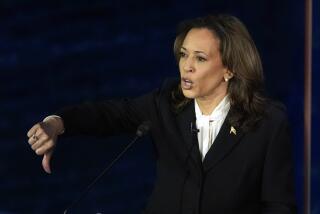Alleged Scandal Rocks Poland
- Share via
WARSAW — The new scandal mesmerizing Poland seems lifted from a Cold War dossier: Spies, oil traders, a polo player and a billionaire are tangled in a rumored plot by Moscow to manipulate the politics and fortunes of its smaller neighbor.
“It’s a sad, ridiculous story about corruption and political vendettas,” said Ryszard Maria Owczarek, a painter who has been avidly following the tale of death threats and rumored bribes that have absorbed the Polish media. “Many ugly things will come out. The dirt is already being heaped.”
The focus of intrigue is Jan Kulczyk, this country’s richest man and a friend to President Aleksander Kwasniewski. A special committee of Parliament is investigating allegations that Kulczyk -- acting with the president’s blessing -- met with a former Russian spy to negotiate the sale of an important oil refinery to a Moscow-controlled corporation.
The possibility of Russia consolidating more control over Poland’s oil industry is an unsettling prospect for a nation that last century lived under the fist of a Russian czar and Soviet apparatchiks.
Russian companies supply much of the oil to former Soviet bloc nations, and Polish intelligence says this domination allows Moscow to meddle in political affairs of Lithuania, the Czech Republic and others.
“We have enemies, and one of them is Russian President [Vladimir V.] Putin,” said Piotr Stasinski, deputy editor of Poland’s leading newspaper, Gazeta Wyborcza. “Putin wants to use the power of big Russian companies to rebuild imperial politics in different ways -- not with tanks, but with oil pipes to make the countries in the sphere of Moscow’s influence dependent upon raw materials.”
Kulczyk has denied wrongdoing but has yet to appear before the special committee. Kwasniewski has accused the committee’s right-wing politicians of orchestrating a “witch hunt” and a “creeping coup” to disgrace him and his leftist party of former communists.
The scandal began as a whisper but over the months has erupted into a roar.
Some government officials and investigators suggest the case has too many shadows and crossed allegiances to ever be solved.
According to evidence heard by the committee, Polish intelligence said Kulczyk met in a Vienna restaurant in the summer of 2003 with Vladimir Alganov, a former KGB agent whose contacts with politicians in the 1990s helped to bring down the Polish government. Alganov is now an executive in a Russian-owned oil venture that was seeking to buy Poland’s refinery in the port of Gdansk.
Poland imports about 90% of its oil and gas from Russia. The Gdansk refinery would offer Warsaw some protection against shortages or price gouging if Moscow ever threatened to significantly raise prices or shut down oil shipments.
“I don’t think anybody needs to be persuaded on how dangerous it would be if Russia had its hands not just on oil supplies but also on the processing and sale of oil,” Zbigniew Siemiatkowski, Poland’s former chief of intelligence, told Gazeta Wyborcza.
Siemiatkowski had earlier told the parliamentary committee: “What I’m saying is not an expression of anti-Russian phobia, but knowledge I received as head of intelligence.”
Kulczyk’s meeting with Alganov came to light during an investigation into PKN Orlen, Poland’s largest oil company. Kulczyk is a shareholder in Orlen.
The investigation led to the arrest of Marek Dochnal, a Polish lobbyist and polo player who likes to show off a picture of himself and Britain’s Queen Elizabeth.
Dochnal is accused of offering a Polish politician a Mercedes -- equipped with a TV -- in exchange for the government steering oil and steel contracts to Russian firms.
Deciphering what, if anything, may have occurred between Kulczyk and Alganov has proved more vexing. Kulczyk is one of Poland’s most powerful men. His business interests include communications, highway construction, cars, energy and insurance.
As the scandal widened this month, Kulczyk checked into a clinic in London with heart problems and canceled an appearance before the special committee. He returned to Poland last week and is scheduled to testify today.
Polish intelligence has revealed only some of what it knows about the case.
The intelligence community is split in its support for Kwasniewski and his right-wing opponents; different players have leaked competing stories to bolster their side.
The parliamentary committee investigating the case has been accused of divulging only information damaging to Kulczyk and the president. At least one right-wing committee member said Kulczyk committed treason and the president should be impeached.
“It will be difficult for the president to survive this,” said Zbigniew Wasserman, a conservative on the committee. He added that Kwasniewski and other leftist politicians and businessmen were using Orlen to benefit their political parties while tapping Polish intelligence agencies “to act as a protective umbrella for those in power.”
“This scandal shows that talk of free markets and capitalism are just slogans,” said Wasserman, adding that he and other committee members had received threats, including cellphone text messages. “This reveals it’s all about who you know.”
Former communists have blamed the special committee for instigating fears about Russia to taint Kwasniewski’s Democratic Left Alliance party, or SLD.
The aim of the committee is to “destroy its political enemies and promote its own members,” said Leszek Miller, former prime minister and an SLD member. “The animal being hunted -- the president, me and the former communists -- is very clearly defined.”
Zenon Sobczyk, a retired military officer shopping in downtown Warsaw, said he believed that the affair amounted to Polish political vendettas mixed with a veiled plot by Moscow to gain more control of the country.
“I’m not afraid of Russia,” he said. “They can’t control Poland any longer. There’s some corruption in this scandal, but I think it’s mostly an attempt to hurt the president. It’s all a political game.”
More to Read
Sign up for Essential California
The most important California stories and recommendations in your inbox every morning.
You may occasionally receive promotional content from the Los Angeles Times.











